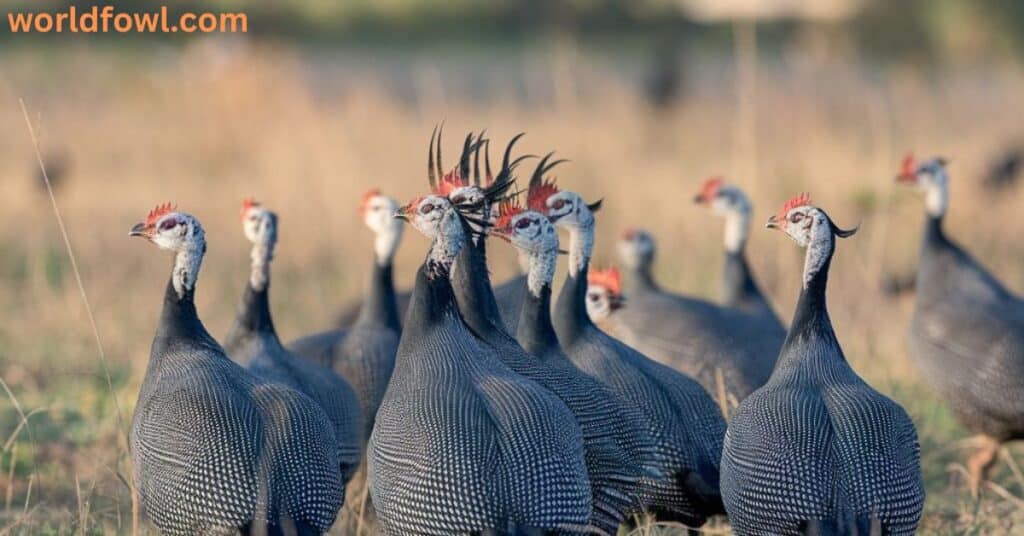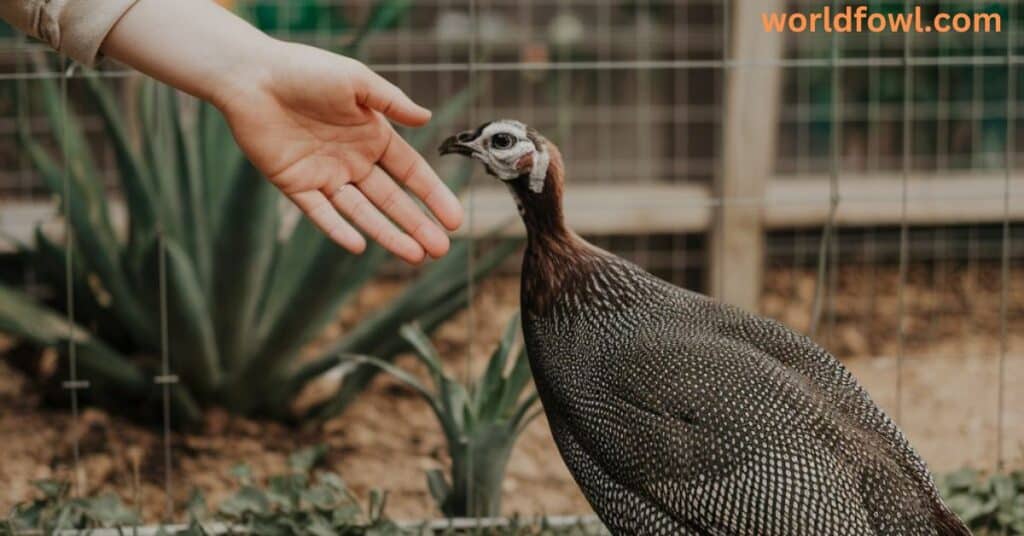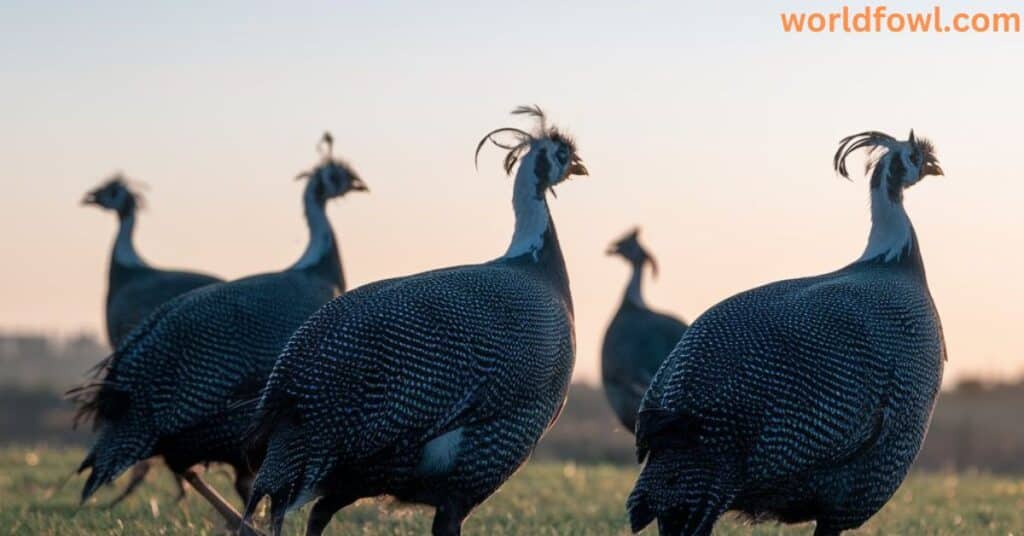Guinea fowl are often seen as quirky, inquisitive creatures that roam around farms and rural areas. These birds, with their distinctive helmets and speckled feathers, are often praised for their benefits in pest control, particularly when it comes to managing insects like ticks. But what happens when these usually calm birds turn aggressive? Do guinea fowl attack humans?
This is a question that many people ask when considering raising guinea fowl on their farms or around their homes. While these birds are known for their protective instincts, territorial behavior, and the occasional surge of aggression, they don’t generally pose a threat to humans. However, it’s crucial to understand the conditions under which they may display aggression and how to avoid or manage such situations.
In this post, we’ll take a deep dive into the behavior of guinea fowl, explore their natural instincts, and explain the factors that might lead to aggression. We’ll also provide practical tips on how to handle these birds and ensure safe interactions, whether you’re raising them for their agricultural pest management abilities, their meat, or simply as a unique pet.
What Are Guinea Fowl?

Guinea fowl are a type of game bird originally native to Africa. They belong to the Numididae family, which includes several species, but the Helmeted Guinea Fowl is by far the most common. These birds are immediately recognizable thanks to their distinctive appearance: dark gray feathers speckled with white spots, a helmet-like crest on their heads, and a bold, almost alarm-like call.
Guinea fowl have been domesticated in many parts of the world, where they used primarily for their meat, eggs, and pest control benefits. These birds are excellent pest control agents, consuming large amounts of insects, such as ticks, beetles, grasshoppers, and even small snakes. This trait has made them invaluable on farms and in rural areas, where they help manage agricultural pests naturally, without the need for chemicals.
Overview of Guinea Fowl
Guinea fowl are medium-sized birds, about the size of a typical chicken, but with longer legs and a more upright posture. They are most commonly raised in rural and farm environments, where their role in tick control and snake deterrence is highly appreciated. While guinea fowl are somewhat similar to chickens, they tend to be more independent and less likely to rely on humans for companionship or food.
Unlike chickens, which can be kept in large numbers in close proximity, guinea fowl are more territorial and prefer to live in smaller flocks. In the wild, they typically form large groups to help protect one another from predators, using their loud calls to alert the flock to danger.
Behavior and Social Structure
Guinea fowl are social creatures that thrive in groups. They live in flocks, which can range from just a few birds to several dozen. Their social structure is hierarchical, with dominant birds leading the group and making decisions about movement and foraging. Flock members communicate with each other through vocalizations and body language. Guinea fowl are known to be very vocal, using a range of calls to communicate with each other, warn of danger, or simply announce their presence.
However, despite their social nature, guinea fowl are relatively independent compared to other domestic birds. They are not as reliant on human interaction for food or comfort, and they often prefer to keep their distance from people, especially if they feel threatened or stressed. Their wariness of human presence can make them more difficult to tame or socialize, but it also contributes to their natural defense mechanisms.
Role in Agriculture and Pest Control
One of the primary reasons guinea fowl valued on farms is for their agricultural pest management abilities. These birds are natural foragers, and they spend much of their time searching for food, which includes insects, seeds, and small rodents. Guinea fowl are particularly effective at tick control, which has earned them a reputation as valuable partners in maintaining a healthy and safe environment for livestock and humans alike. By eating ticks, guinea fowl help reduce the spread of diseases like Lyme disease, which can affect both animals and humans.
In addition to their role in pest control, guinea fowl are also known for their ability to deter snakes. Their sharp eyes and acute hearing allow them to detect the presence of snakes before most other animals can. When they sense a snake, guinea fowl will often produce loud calls and engage in aggressive postures, such as puffing out their feathers or flapping their wings. These behaviors are thought to be a way of scaring off or distracting the snake, giving the guinea fowl a better chance of escaping danger.
See Also : Do Bats Attack Humans? The Hidden Dangers!
Do Guinea Fowl Attack Humans?

While guinea fowl are not typically aggressive toward humans, there are certain situations that can trigger aggressive behavior. These behaviors are often rooted in the birds’ territorial instincts, hormonal changes, or simply a misunderstanding of human actions. So, do guinea fowl attack humans? The answer isn’t simple. Guinea fowl can become aggressive, but it’s usually a reaction to something they perceive as a threat.
General Behavior Toward Humans
For the most part, guinea fowl are shy and prefer to avoid human contact. They are more likely to observe from a distance, keeping an eye on any human activity without engaging. Guinea fowl are not known to seek out human companionship the way chickens or ducks might. In fact, they can be quite elusive, especially in the wild.
However, when guinea fowl are raised in a more controlled environment—such as a farm where they are frequently handled by humans—they can become more accustomed to human presence. This doesn’t mean they are friendly, but rather that they learn to tolerate it. Their curiosity may lead them to approach humans, especially if food is involved, but it’s important to understand that guinea fowl don’t have the same socialization behaviors as more domesticated birds like chickens.
Territorial Instincts and Aggressive Behaviors
Guinea fowl are known for their territorial behavior. Like many wild animals, they view their personal space as something to be fiercely protected. If they feel that their space invaded—whether it’s their food, nesting area, or even the area they are accustomed to roaming—they may respond aggressively. This aggression most commonly see in males, particularly during the breeding season when hormones are fluctuating and territoriality is heightened.
A guinea fowl might puff up its feathers, make loud vocalizations, or even charge at perceived threats to warn them off. While these actions may seem intimidating, they are usually more about defending territory than attacking humans directly. Guinea fowl tend to use these behaviors to scare off intruders rather than engage in physical confrontation. However, if they feel cornered or trapped, they may resort to defensive pecking or wing-flapping as a last resort.
Protective Instincts
Guinea fowl also exhibit strong protective instincts, particularly when it comes to their young. A female guinea fowl will fiercely defend her nest or chicks if she feels they are in danger. Even if a human approaches her nesting area, she may engage in defensive behavior to protect her offspring. This can include aggressive vocalizations, posturing, and even charging at the perceived threat.
These protective behaviors are common in many species, not just guinea fowl, and are part of the bird’s survival strategy. A mother guinea fowl has evolved to protect her young from predators, and her aggressive actions are a response to what she perceives as a danger to her brood.
See Also : Do Buzzards Attack Humans? The Truth!
Reasons for Aggression in Guinea Fowl

There are several reasons why guinea fowl might display aggression toward humans or other animals. These include territoriality, hormonal changes, and the misinterpretation of human actions. Below, we explore these reasons in greater detail.
Protecting Their Territory or Young
As mentioned, guinea fowl are highly territorial creatures. If they feel their space threatened, they may become aggressive in an effort to protect their territory. This behavior is more common in males, who may see a human or other animal as a rival for space or food. The territorial behavior of guinea fowl especially pronounced during the breeding season, when males are competing for mates and space.
Similarly, female guinea fowl are particularly protective of their eggs and young. If they feel that their chicks are in danger, they will not hesitate to defend them aggressively. This is a natural behavior that has evolved over time to ensure the survival of the species. A female guinea fowl may display aggressive vocalizations or posturing when she senses danger, warning off potential threats.
Mating Season and Hormonal Changes
The breeding season is another time when guinea fowl can become aggressive. During this time, males experience hormonal changes that drive them to defend their territory and mates more aggressively. This breeding aggression not typically directed at humans, but it can manifest in more frequent outbursts of aggression toward other animals or even humans who inadvertently come too close.
Male guinea fowl are particularly territorial during the mating season, and their instinct to protect their space and mates can lead them to become more defensive. In some cases, the presence of a human in their territory may trigger a response, resulting in a brief burst of aggression. It’s essential to recognize that this behavior is temporary and tied to hormonal fluctuations during the breeding season.
Misinterpretation of Human Behavior
Guinea fowl, like many animals, rely heavily on body language and subtle cues to interpret the intentions of those around them. A human’s sudden movement or loud noise perceived as a threat by a guinea fowl, prompting them to respond defensively. In many cases, aggressive behavior in guinea fowl is the result of a misinterpretation of human actions rather than intentional hostility.
Humans may inadvertently trigger this behavior by making quick movements, invading the bird’s space, or making sudden loud noises. Understanding guinea fowl’s social structure and instincts can help you avoid behaviors that may lead to aggression.
See Also : Do Quails Attack Humans? A Deep Dive!
How to Handle Aggressive Guinea Fowl

If you find yourself in a situation where a guinea fowl is displaying aggression, it’s important to remain calm and use the appropriate strategies to handle the bird safely. Here are some tips for managing aggressive guinea fowl and minimizing the chances of an attack:
Recognizing the Signs of Aggression
Before a guinea fowl attacks, there are several signs that can indicate aggression. These include:
- Puffed-up feathers: This is a classic sign of territorial behavior. The bird is trying to appear larger to intimidate potential threats.
- Wing-flapping: Guinea fowl will often flap their wings when they feel threatened or when they are preparing to charge at something they perceive as a danger.
- Loud vocalizations: A guinea fowl will produce loud calls to alert other members of the flock or to warn off intruders.
- Pecking or charging: In some cases, a guinea fowl may become so agitated that it will charge at the perceived threat or begin pecking at it.
Dealing with Aggressive Behavior
If you find yourself facing an aggressive guinea fowl, the best course of action is to remain calm and avoid sudden movements. Here’s what to do:
- Slowly back away: If a guinea fowl appears aggressive, don’t make eye contact and back away slowly. This will help to de-escalate the situation.
- Avoid sudden movements: Quick, jerky movements can startle the bird and escalate aggression. Move deliberately and slowly.
- Use a barrier: If you need to remove the guinea fowl from a particular area, consider using a physical barrier, like a fence or gate, to separate yourself from the bird.
Preventing Aggressive Encounters
To prevent aggressive encounters, you should understand guinea fowl’s natural behavior and give them the space they need. Here are some preventative tips:
- Respect their space: Always approach guinea fowl slowly and respectfully. Avoid invading their personal space.
- Limit sudden movements: Guinea fowl are naturally wary of sudden movements. Try to avoid abrupt gestures when around them.
- Provide a safe, spacious environment: Make sure your guinea fowl have ample space to roam. Overcrowding can increase stress and aggression.
Prevention and Safety Tips
If you’re raising guinea fowl and want to minimize the chances of aggression, follow these practical safety tips:
- Ensure a safe environment: Provide plenty of space for your guinea fowl to roam and forage. Guinea fowl are more likely to become aggressive if they feel confined or threatened.
- Avoid provoking the birds: Guinea fowl are naturally defensive. Don’t try to approach them too quickly or invade their space.
- Teach others how to behave around the birds: If children or other people are interacting with guinea fowl, teach them to be gentle and slow. Sudden actions can trigger aggression.
See Also : How and Where Do Geese Sleep? The Secrets of Goose Slumber
FAQs: Do Guinea Fowl Attack Humans ?
Are Guinea Fowl More Aggressive Than Other Domestic Birds?
Guinea fowl are generally less aggressive than some other domestic birds, like roosters or turkeys. However, their territorial behavior can make them more likely to display aggression if they feel threatened or during the breeding season.
Can Guinea Fowl Injure Humans?
While guinea fowl have sharp beaks and claws, they are not likely to cause serious injury to humans. However, defensive pecking or charging may cause minor injuries, especially if the bird feels threatened.
How Can You Tell If a Guinea Fowl Is About to Attack?
Look for signs like puffed-up feathers, wing-flapping, and loud vocalizations. If these behaviors are observed, the bird is likely feeling threatened and may act aggressively.
Do Guinea Fowl Attack Other Animals?
Guinea fowl can be aggressive toward other animals, especially when they feel their territory or offspring are threatened. However, they are generally not aggressive unless they feel provoked or cornered.
Conclusion: Do Guinea Fowl Attack Humans?
Do guinea fowl attack humans? While these birds can become aggressive, especially in defense of their territory or young, they are typically non-threatening toward humans. Guinea fowl are naturally protective, and their aggression is usually a response to a perceived threat rather than an inherent desire to harm humans.
By understanding the behavior and instincts of guinea fowl, you can create an environment where both humans and birds can coexist peacefully. Whether you’re raising guinea fowl for their pest control benefits, as tick control specialists, or as part of your farming operation, respecting their space and instincts is key to maintaining a safe and productive relationship with these fascinating birds.

Henry James is a seasoned blogger and a passionate storyteller on “World Fowl.” With years of experience crafting engaging content, he brings a unique blend of expertise and creativity to his writing. Henry specializes in exploring diverse topics with depth and clarity, captivating readers worldwide.







